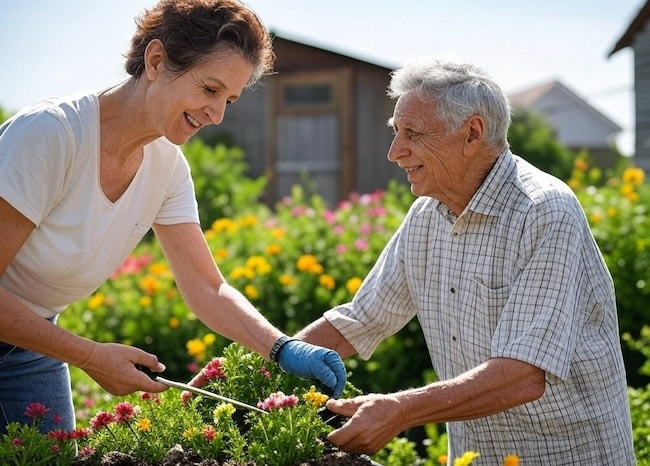The holiday season holds cherished traditions, but when a loved one has Alzheimer's, these familiar rituals can suddenly feel overwhelming and confusing for them, and stressful for you.
Rather than abandoning celebration altogether, the key to a peaceful and joyful season lies in thoughtful adaptation. By simplifying activities and focusing on sensory experiences, you can create moments of connection that honor the spirit of the holidays while respecting your loved one's current needs and abilities.

Discover six compassionate ways to modify your traditions to reduce anxiety and spark genuine moments of happiness for everyone involved.
How to Include Seniors with Alzheimer’s or other Forms of Dementia in Holiday Activities
You want older adults living with Alzheimer’s disease or dementia to feel included in the holiday festivities.
But you also don’t want them to get overstimulated or agitated.
Whether you’re hosting the get-together or taking them to someone’s house, these 6 tips help you adapt holiday activities for seniors with dementia so they can participate comfortably.
6 ways to adapt holiday activities for seniors with dementia
1. Keep groups small to avoid overstimulation
Too many people, too much noise, and a flurry of activity can easily overstimulate someone with Alzheimer’s or dementia.
Don’t feel stuck with the usual traditions; make changes that will help your older adult stay calm and relaxed.
For example, instead of hosting one big party for the entire extended family, have a couple of casual get-togethers with small groups of relatives over a couple of weeks. Or, limit the guest list to immediate family only.
2. Schedule Essential Activities for their Best Time of Day
There are times of day when your older adult is at their best.
Please choose the most meaningful holiday activities and schedule them for times when your older adult is most likely to participate successfully.
For example, if they get agitated in the evenings, have the holiday party earlier in the day.
Or, if your older adult doesn’t wake up until late morning, have the family gathering in the evening so they can stick to their regular schedule.
3. Set aside a private, quiet space and encourage one-on-one visits
Whether the holiday gathering is at your house or a relative’s, it will be crowded and noisy.
To avoid overstimulating your older adult, arrange for them to stay in a quiet room away from the group.
Family members can take turns spending quality time with them in their calm space.
4. Plan Activities Aging Adults will Enjoy
To help your older adult feel included, plan activities they already enjoy.
For example, if mom still loves to bake, organize a group cookie-making session. Or, if dad loves watching football, have everyone watch a game together.
Another idea is to have fun with music – something that many people with Alzheimer’s and dementia really enjoy.
You could have a family sing-along to your older adult’s favorite tunes, ask the kids to sing traditional holiday songs, have a little dance party, or play the songs they love.
5. Avoid Significant Changes in Diet
Many older adults have sensitive digestive systems.
Even though holiday meals are filled with delicious treats, it might be better to limit foods that are too different from their ordinary diet.
Rich foods could upset their stomach, and alcohol can cause problems with many medications.
Plus, having sugar or alcohol may cause some people with dementia to behave differently (and not in a good way).
6. Help Children Spend Time with Aging Adults
Holidays are an excellent opportunity for older adults to spend time with their grandkids, nieces, or nephews.
Talking with children ahead of time about Alzheimer’s or dementia helps them overcome fears and encourages them to spend time with your older adult.
Before the holiday visit, let kids know that odd behaviors or angry outbursts aren’t their fault, but are a regular part of the disease.
During the visit, have an adult keep an eye on the kids in case your older adult says or does something unexpected.
VIDEO: Adapting the Holidays For Your Loved One with Dementia
*Bonus tip: Take a short break yourself
While family is around, take the opportunity to ask someone to take care of your older adult for an hour or two.
Please don’t wait for someone to offer, they might not realize you need (and deserve!) a break.
Take a nap, take a long shower, watch some TV, call a friend…anything that helps you relax.
Taking a break, no matter how brief, allows you to rest, recharge, and de-stress. After your well-deserved break, you’ll be better able to help your older adult have the best holiday possible.
Final Thoughts on Spending the Holidays When Your Loved One Has Dementia
Remember, the most successful holiday celebrations are measured in moments of connection, not the perfection of traditions. By letting go of expectations and embracing these adapted activities, you're not settling for less—you're creating a new kind of holiday magic centered on comfort and love.
Your patience and creativity in modifying these traditions can transform potential stress into precious memories, proving that the true spirit of the season shines brightest when we meet our loved ones exactly where they are.
Recommended for you:
- 48 Amazing Gifts for Seniors with Alzheimer’s or Dementia
- Prepare Family Before Holiday Visits with Seniors
- Self Care During the Holidays: 10 Stress Relief Tips for Caregivers
About the Author

Connie is the founder of DailyCaring.com and was a hands-on caregiver for her grandmother for 20 years. (Grandma made it to 101 years old!) She knows how challenging, overwhelming, and all-consuming caring for an older adult can be. She also understands the importance of support, especially in the form of practical solutions, valuable resources, and self-care tips.













